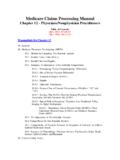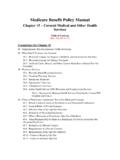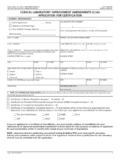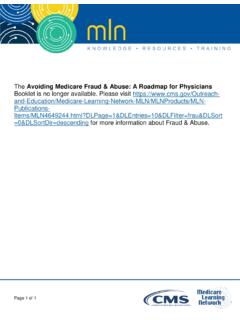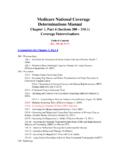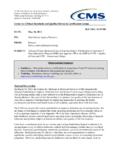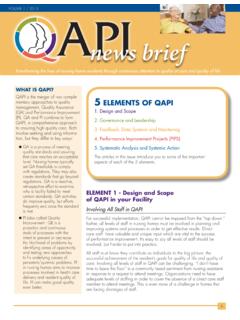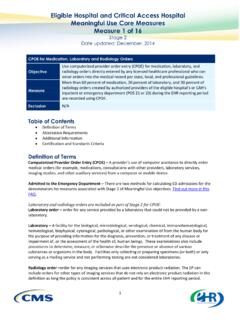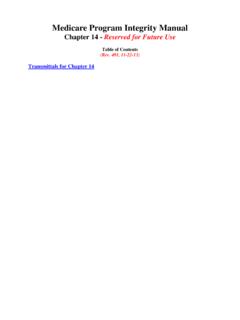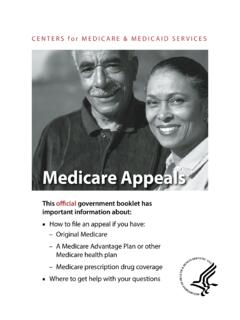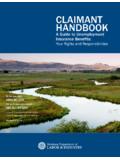Transcription of Medicare Claims Processing Manual - Centers for Medicare ...
1 Medicare Claims Processing Manual Chapter 29 - Appeals of Claims Decisions Table of Contents (Rev. 4380, 08-30-19). Transmittals for Chapter 29. 110 - Glossary 200 - CMS Decisions Subject to the Administrative Appeals Process 210 - Who May appeal - Provider or Supplier Appeals When the Beneficiary is Deceased 220 - Steps in the Appeals Process: Overview 230 - Where to appeal 240 - Time Limits for Filing Appeals & Good Cause for Extension of the Time Limit for Filing Appeals - Good Cause - Conditions and Examples That May Establish Good Cause for Late Filing by Beneficiaries - Conditions and Examples That May Establish Good Cause for Late Filing by Providers, Physicians or Other Suppliers - Good Cause Administrative Relief Following a Disaster - Procedures to Follow When a Party Fails to Establish Good Cause 250 - Amount in Controversy (AIC) Requirements - Amount in Controversy General Requirements - Principles for Determining Amount in Controversy - Aggregation of Claims to Meet the Amount in Controversy 260 - Parties to an appeal 270 - Appointment of Representative - Appointment of Representative - Introduction - Who May be an Appointed or Authorized Representative - How to Make and Revoke an Appointment - When and Where to Submit the Appointment - rights and Responsibilities of a Representative - Duration of Appointment - Curing a Defective Appointment of Representative - Incapacitation or Death of Beneficiary - Disclosure of Individually Identifiable Beneficiary Information to an Appointed Representative - Assignment of Appeals rights - Assignment of appeal rights - Introduction - Who May be an Assignee - How to Make and Revoke a Transfer of appeal rights - When to Submit the Transfer of appeal rights - Where to Submit the Transfer of appeal rights - rights of the Assignee of
2 appeal rights - Duration of Transfer of appeal rights - Curing a Defective Transfer of appeal rights - Disclosure of Individually Identifiable Beneficiary Information to Assignees - Medicare Secondary Payer (MSP) Specific Limitations or Additional Requirements with Respect to the Appointment of Representatives 280 - Fraud and Abuse - Fraud and Abuse - Authority - Inclusion and Consideration of Evidence of Fraud and/or Abuse - Claims Where There is Evidence That Items or Services Were Not Furnished or Were Not Furnished as Billed - Responsibilities of Adjudicators - Requests to Suspend the Appeals Process - Continuing Appeals of Providers, Physicians, or Other Suppliers Who Are Under Fraud or Abuse Investigations - Appeals of Claims Involving Excluded Providers, Physicians, or Other Suppliers 290 - Guidelines for Writing Appeals Correspondence - General Guidelines - Letter Format - How to Establish Reading Level - Writing in Plain Language - Required Elements in Appeals Correspondence 300 - Disclosure of Information - General Information - Disclosure of Information to Third Parties - Fraud and Abuse Investigations - Medical Consultants Used - appeal Decision Involving Multiple Beneficiaries 310 - Redetermination - The First Level of appeal - Filing a Request for Redetermination - Time Limit for Filing a Request for Redetermination - Reporting Redeterminations on the Appeals Report - The Redetermination - The Redetermination Decision - Dismissals - Dismissal Letters - Model Dismissal Notices Processing Request to Vacate Dismissals - Medicare Redetermination Notice (For Partly or Fully Unfavorable Redeterminations).
3 - Medicare Redetermination Notice (for Fully Favorable Redeterminations). - Effect of the Redetermination - System and Processing Requirements for Use of Secure Internet Portal/Application to Support Appeals Activities - Effectuation of the Redetermination Decision - QIC Remands 320 - Reconsideration - The Second Level of appeal - Filing a Request for a Reconsideration - Time Limit for Filing a Request for a Reconsideration - MAC Responsibilities - General - QIC Case File Development - QIC Case File Preparation - Forwarding QIC Case Files - QIC Jurisdictions - Tracking Cases - Effectuation of Reconsiderations 330 - Administrative Law Judge (ALJ) Hearing or Attorney Adjudicator Review at Office of Medicare Hearings and Appeals (OMHA)- The Third Level of appeal - Requests for an ALJ Hearing - Forwarding Requests to OMHA. - Review and Effectuation of OMHA Decisions - Effectuation Time Limits & Responsibilities - Duplicate OMHA Decisions - Payment of Interest on OMHA Decisions 340 - Departmental Appeals Board - Appeals Council - The Fourth Level of appeal - Recommending Agency Referral of OMHA Decisions or Dismissals - Effectuation of Appeals Council Orders and Decisions - Requests for Case Files - Payment of Interest on Appeals Council Decisions 345 - District Court Review - The Fifth Level of appeal - Requests for District Court Review by a Party - Effectuation of District Court Decisions - Payment of Interest of District Court Decisions 350 - Workload Data Analysis 360 - Managing Appeals Workloads - Standard Operating Procedures - Execution of Workload Prioritization - Workload Priorities 110 - Glossary (Rev.)
4 4380, Issued: 08-30-19, Effective: 07-08-19, Implementation: 10- 01-19). Adjudicator The entity responsible for making the decision at any level of the Medicare claim decision making process, from initial determination to the final level of appeal , on a specific claim . Administrative Law Judge (ALJ) Adjudicator employed by the Department of Health and Human Services (HHS), Office of Medicare Hearings and Appeals (OMHA) that holds hearings and issues decisions related to level 3 of the appeals process. Affirmation - A term used to denote that a prior Claims determination has been upheld by the current Claims adjudicator. Although appeals through the OMHA level are de novo, CMS and its contractors often use this term when an adjudicator reaches the same conclusion as that in the prior determination, even though he/she is not bound by the prior determination. Amount in Controversy (AIC) - The dollar amount required to be in dispute to establish the right to a particular level of appeal .
5 Congress establishes the amount in controversy requirements. Appeals Council The Medicare Appeals Council (herein Appeals Council), a division within the Departmental Appeals Board, provides the final level of administrative review of Claims for entitlement to Medicare and individual Claims for Medicare coverage and payment. (See also Departmental Appeals Board.). Appellant - The term used to designate the party ( , the beneficiary, provider, supplier, or other person showing an interest in the claim determination) or the representative of the party that has filed an appeal . The adjudicator determines if a particular appellant is a proper party or representative of a proper party. Applicable plan Applicable plan means liability insurance (including self-insurance), no-fault insurance, or a workers' compensation law or plan. Appointed representative The individual appointed by a party to represent the party in a Medicare claim or claim appeal . Assignee (1) With respect to the assignment of a claim for items or services, the assignee is the supplier who has furnished items or services to a beneficiary and has accepted a valid assignment of a claim .
6 OR. (2) With respect to an assignment of appeal rights , an assignee is a provider or supplier who is not already a party to an appeal , who has furnished items or services to a beneficiary, and has accepted a valid assignment of the right to appeal a claim executed by the beneficiary. Assignment of appeal rights The transfer by a beneficiary of his or her right to appeal under the Claims appeal process to a provider or supplier who is not already a party, and who provided the items or services to the beneficiary. Assignor A beneficiary whose provider of service or supplier has taken assignment of a claim , or assignment of an appeal of a claim . Attorney Adjudicator - A licensed attorney employed by OMHA with knowledge of Medicare coverage and payment laws and guidance, authorized to take the actions provided for in 42 CFR 405 subpart I on requests for ALJ hearing and requests for reviews of QIC dismissals. Authorized representative An individual authorized under State or other applicable law to act on behalf of a beneficiary or other party involved in the appeal .
7 The authorized representative will have all of the rights and responsibilities of a beneficiary or party, as applicable, throughout the appeals process. Beneficiary Individual who is enrolled to receive benefits under Medicare Part A and/or Part B. Contractor - An entity that contracts with the Federal government to review and/or adjudicate Claims , determinations and/or decisions. Date of Receipt A determination, decision or notice is presumed to have been received by the party five days from the date included on the determination or decision, unless there is evidence to the contrary. NOTE: Throughout Chapter 29, reference to day or days means calendar days unless otherwise specified. Departmental Appeals Board (DAB) Review - The DAB provides impartial, independent review of disputed decisions in a wide range of Department of Health and Human Services programs under more than 60 statutory provisions. The Medicare Appeals Council (herein Appeals Council), a division within the Departmental Appeals Board, provides the final level of administrative review of Claims for entitlement to Medicare and individual Claims for Medicare coverage and payment.
8 (See section 340 in this chapter.). De Novo - Latin phrase meaning anew or afresh, used to denote the manner in which Claims are adjudicated in the administrative appeals process. Adjudicators at each level of appeal make a new, independent and thorough evaluation of the claim (s) at issue, and are not bound by the findings and decision made by an adjudicator in a prior determination or decision. Decisions and Determinations -If a Medicare appeal request does not result in a dismissal, adjudication of the appeal results in either a determination or decision. There is no apparent practical distinction between these two terms although applicable regulations use the terms in distinct contexts. A decision that is reopened and thereafter revised is called a revised determination.. Dismissal - An action taken by an adjudicator when an appeal will not be conducted as requested. A request for appeal may be dismissed for any number of reasons, including: 1.
9 Abandonment of the appeal by the appellant;. 2. A request is made by the appellant to withdraw the appeal ;. 3. A determination that an appellant is not a proper party;. 4. The amount in controversy requirements have not been met; and 5. The appellant has died and no one else is prejudiced by the Claims determination. Limitation on Liability Determination- Section 1879 of the Social Security Act (the Act) provides financial relief to beneficiaries, providers and suppliers by permitting Medicare payment to be made, or requiring refunds to be made, for certain services and items for which Medicare coverage and payment would otherwise be denied. This section of the Act is referred to as the limitation on liability provision.. Both the underlying coverage determination and the limitation on liability determination may be challenged. For more detailed information see chapter 30 of this Manual . Medicare number and/or Medicare beneficiary identifier (Mbi) - are general terms describing a beneficiary's Medicare identification number.
10 Medicare beneficiary identifier references both the Health Insurance claim Number (HICN) and the Medicare Beneficiary Identifier (MBI) during the new Medicare card transition period and after for certain business areas that will continue to use the HICN as part of their processes. For the beneficiary population, the term Medicare number is used to describe the Medicare beneficiary identifier (Mbi). Office of Medicare Hearings and Appeals (OMHA) - The Office of Medicare Hearings and Appeals is responsible for level 3 of the Medicare Claims appeal process and certain Medicare entitlement appeals and Part B premium appeals. At level 3 of the appeals process, an appellant may have a hearing before an OMHA ALJ, or review by an attorney adjudicator. Party - A person and/or entity normally understood to have standing to appeal an initial determination and/or a subsequent administrative appeal determination or decision. (See section 210 in this chapter.).
